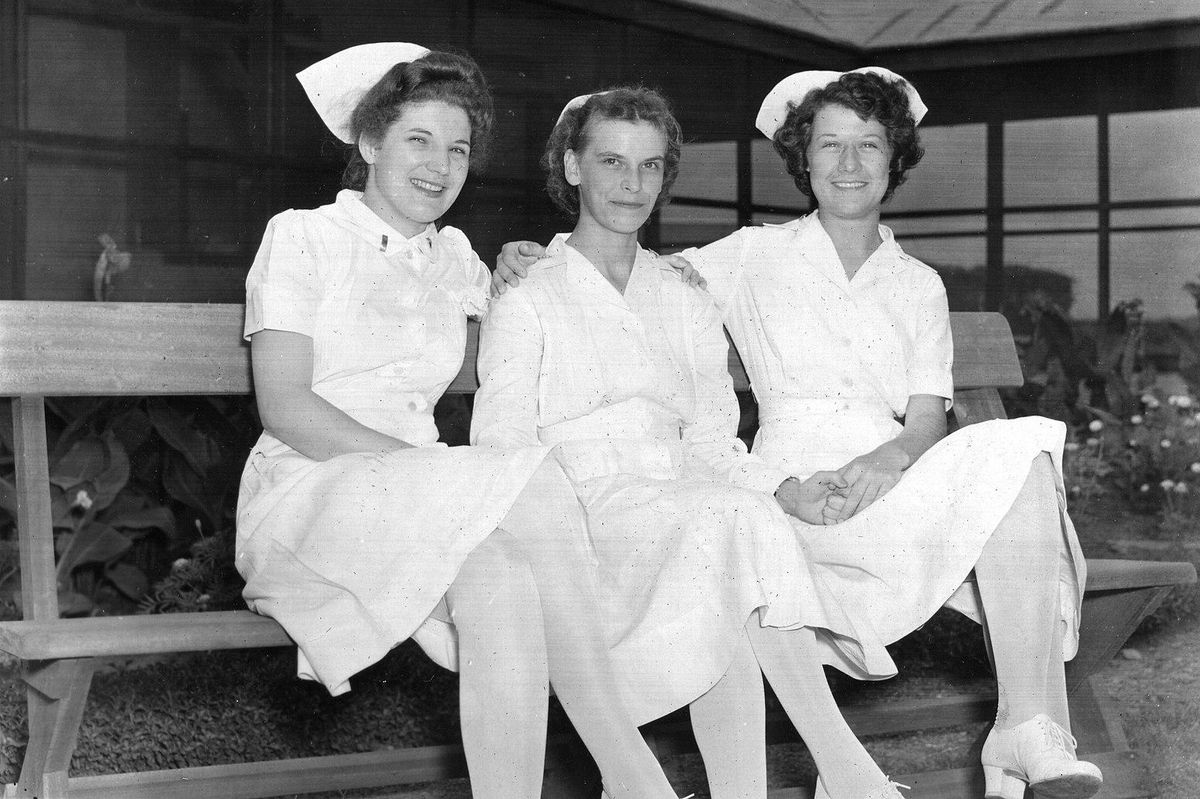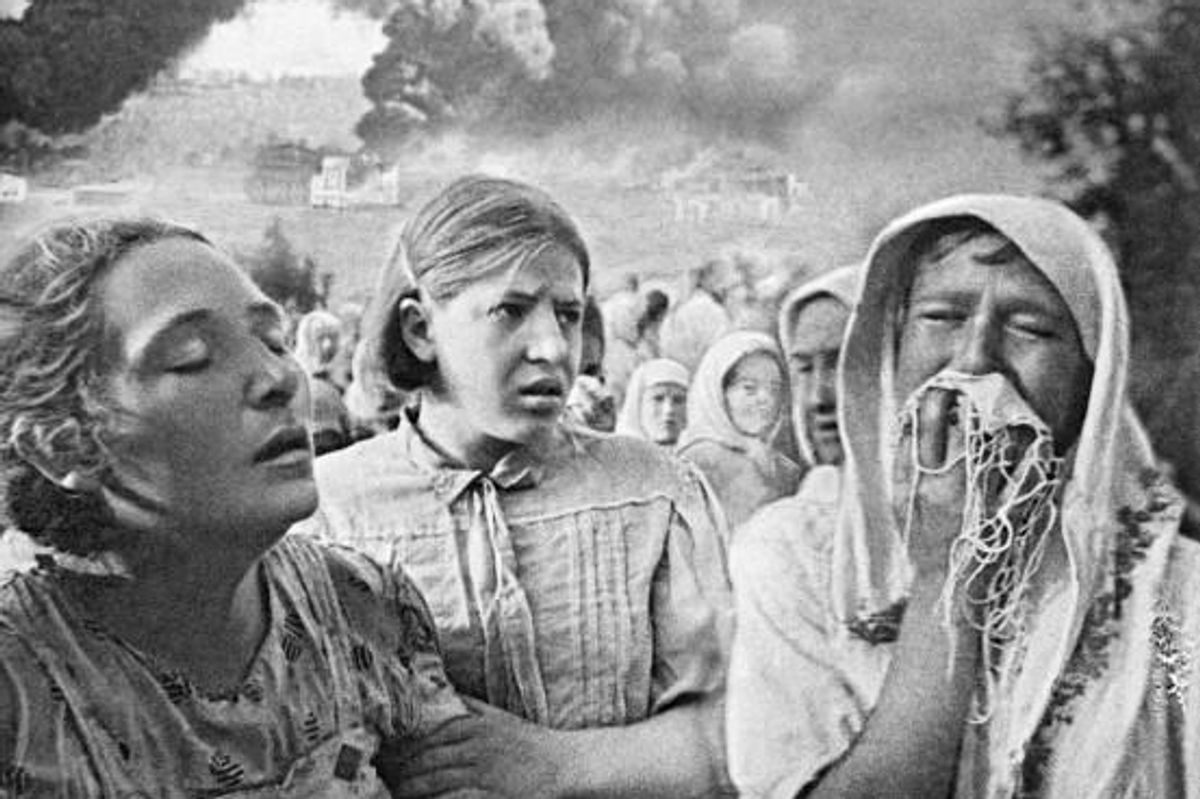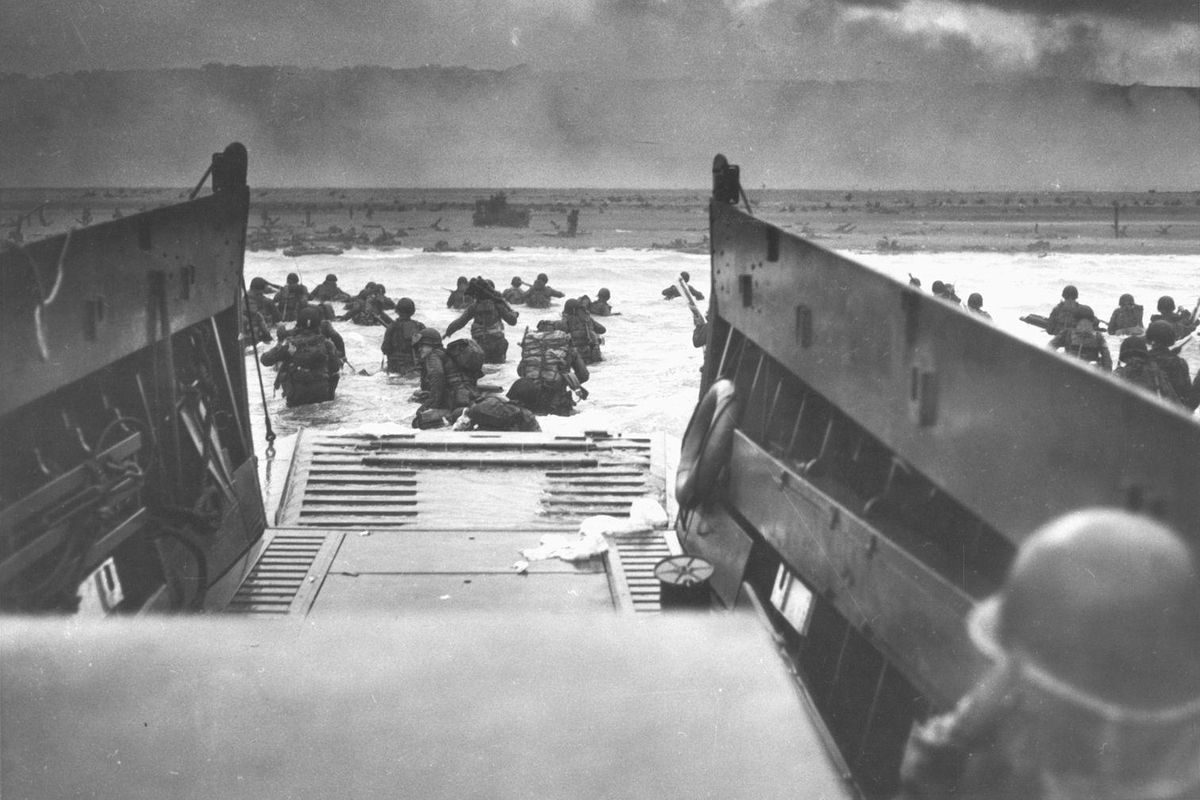
Three World War II nurses sit on a bench in white uniforms.
Trigger warning: Images of war.
The civilian and military deaths of World War II make it, to this day, the most deadly in the history of our world.
But I had no idea of the full scope of this until I watched the video below made in 2015. But first, a tiny little personal story.
.
How many places in the United States have trenches left over from a war with the rest of the world?
I have a friend in Germany who showed me some of the World War II trenches in the woods by his house near Aachen just about 10 years ago. I was blown away by that. We have some things like that left over from the Civil War, but nothing related to a world war. In fact, in some of those trenches and former battlefields, there are still unexploded weapons found even now. What it really means is: World War II is still not finished killing people.

Unexploded bomb found in Koblenz, Germany, 2011.
Image by Holger Weinandt/Wikimedia Commons.
When people think of war, they often think of soldiers and those who actively seek to do battle.
Overall, of the people killed in World War II, one-third of them were military and the rest civilians.
The Soviet Union (Russia) had by far the most casualties, both civilian and military. This was largely due to things like the Siege of Stalingrad — entire cities were cut off from food, water, and supplies for years, and starvation was all around. (It was also because Russia was headed by a ruthless dictator at the time, Joseph Stalin.)

War and people in Kiev, June 23, 1941.
Image by K. Lishko (modified)/Wikimedia Commons.
Then there was the Holocaust, which claimed 6 million Jewish civilians and some others as well, such as Roma ("gypsies"), people with disabilities, gays, etc.
There were also events like D-Day (June 6, 1944), that cost 2,500 U.S. soldiers' lives in a single day.

U.S. army troops drudge to shore during D-Day landing, Omaha Beach, Normandy. June 6, 1944.
Image by U.S. Coast Guard (modified)/Wikimedia Commons.
When you see the scale of this and consider the total number of lives, both civilian and military, from all countries who had casualties in World War II, the figures are simply astounding.
70 million dead. In six years.
More people died in World War II than in any other war in history. Between the civilian and military casualties, it adds up to roughly the entire 2013 population of the states of New York, New Jersey, and California ... combined.
I work on and write about things from all over the Internet, so I've seen pretty much everything “shocking," “terrifying," and all kinds of things “you won't believe."
But this? I've watched the clip at least 10 times, and I still can't get my mind around it.
The image above is just a taste from Neil Halloran's "The Fallen of World War II." You can see the whole video below; it's 18 minutes and chock full of data on how many lives — civilian and military — were lost.
These are some of the more fascinating parts:
- The death count of American soldiers starts at about 2:00, including totals, D-Day, and Okinawa.
- European totals start at 3:20, when Germany invaded Poland. There were so many countries involved, it's pretty amazing. These numbers include battles as well as mass executions.
- At 4:30, the Western Front, involving Britain and the U.S., begins.
- Some really staggering numbers about the Eastern Front (the Soviet Union, including Stalingrad) begin about 5:00. This is where the German army began to incur massive losses. The Soviet Union was the first country to defeat Germany but at an almost unbelievable cost in the lives of soldiers and civilians.
- Civilian deaths, including the Holocaust, begin at 7:30. The Holocaust itself killed about 6 million people.
- Numbers for the Asian theatre, including Hiroshima and Nagasaki, begin at 12:00.
- The grand total is revealed about 13:15, and then that's compared with other conflicts throughout history.
At 07:20, you can pause the narration to interact with the charts. And then, it proceeds to get into the civilian deaths, including The Holocaust. It's fascinating, if pretty sobering.
But the good news is, we haven't had a conflict like it since. Let's do what we can to keep it that way, eh?
Because weapons have become so much more destructive than they were then, the idea of another world war is actually much more unthinkable than ever before.
So you may be thinking, "Hey, Upworthy ... this really isn't very UPworthy, if ya know what I mean?!"
When I first watched this, I was actually shocked at the total numbers of people who died in World War II — especially the totals for people in other countries, which we see less often than those for the U.S. only. When the body count hits 70 million, it's something I can't begin to fathom. The 1905 George Santayana axiom goes, "Those who cannot remember the past are destined to repeat it" ... well, that's what I take from this. Your mileage may vary.
- Iranian cartoonist captures the human cost of war in one image - Upworthy ›
- How to spot an American tourist - Upworthy ›
- How to spot an American tourist - Upworthy ›
- The Japanese pilot who bombed Oregon and then made peace - Upworthy ›
- French woman reunites with the American boyfriend she hasn't seen in the 75 years since they fell in love during WWII. - Upworthy ›
- WW2 lovers were separated after a blind date, but a letter with a map saved them - Upworthy ›






 A woman is getting angry at her coworker.via
A woman is getting angry at her coworker.via  A man with tape over his mouth.via
A man with tape over his mouth.via  A husband is angry with his wife. via
A husband is angry with his wife. via 
 Curling requires more athleticism than it first appears.
Curling requires more athleticism than it first appears.
 Mom hugging crying daughter
Mom hugging crying daughter Dad kissing child on cheek
Dad kissing child on cheek Mom comforting daughter
Mom comforting daughter

 Comfort in a hug: a shared moment of empathy and support.
Comfort in a hug: a shared moment of empathy and support. A comforting hug during an emotional moment.
A comforting hug during an emotional moment. Woman seated against brick wall, covering ears with hands.
Woman seated against brick wall, covering ears with hands.